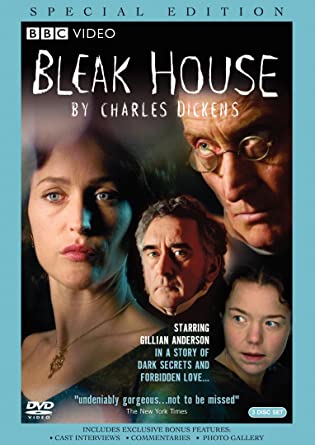Movies |
Bleak House
Charles Dickens
By
Published: Nov 19, 2020
Category:
Drama
Of all the distinguished adaptations of classic English novels, “Bleak House” is among the greatest.
The writer is Andrew Davis, whose credits are impeccable (“Pride and Prejudice,” starring Colin Firth). The production is lavish: great houses, squalid and exalted London, a cast of 2,000. For those who don’t know she spent much of her childhood in London, Gillian Anderson (once of “The X-Files”) might seem an odd choice as the wretchedly unhappy Lady Dedlock? Well, she’s astonishingly moving. This is not a minority opinion. “Bleak House” had 10 Emmy nominations and won a Peabody Award.
For those who haven’t read the novel, it’s thick. But a page-turner. It has the speed of journalism. And the indignation — here, Dickens takes aim at two fat targets: the absurd Chancery Court and the cruel fate of poor children in London. And then there is the overriding story line, which is a mystery — a whodunnit. [To watch Episode 1, click here. To buy the 8-hour DVD from Amazon or rent the video stream, click here. To buy the paperback of the novel, click here.]
I read “Bleak House” decades ago, when I dreamed of becoming a professor and putting kids through their paces analyzing books like this, and I fondly remember the two days I spent holed up with it. What was the secret that Lady Dedlock carried? Why was Tulkinghorn, the slick, dreadful lawyer, so eager to expose her? Onward I read, while the inheritance lawsuit — Jarndyce v. Jarndyce — made its plodding, soul-deadening way through the court, destroying so many lives in the process that it seemed no good could come of it for the young lovers who hoped someday to be made rich by it.
Vladimir Nabokov, in his Lectures on Literature, devotes a brilliant chapter to ‘Bleak House.’ His analysis is acute and detailed; if you want to be dazzled, read the book (or watch the mini-series) and then read it. You’ll see levels you could not imagine on your own.
What you can get on your own is plenty — Dickens writes in a clear, cold rage, which always purifies good writing. On the matter of the Court, he wrote from experience: In 1844, he filed suit over the disputed copyright to ‘A Christmas Carol.’ His opponents declared bankruptcy; although Dickens ‘won,’ court costs wiped out his victory. As for his passion for reform, you will never forget dear Mr. Jarndyce’s words after the death of poor little Jo: "Dead, your Majesty. Dead, my lords and gentlemen. Dead, Right Reverends and Wrong Reverends of every order. Dead, men and women born with Heavenly compassion in your hearts. And dying thus around us every day."


